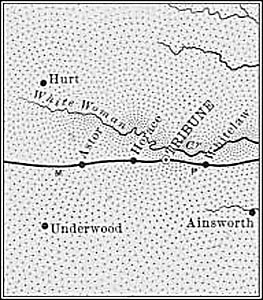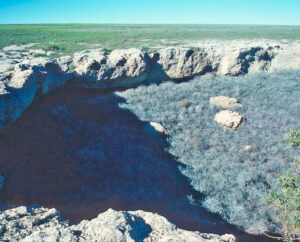
A sod home in Greeley County, Kansas, 1889.
| Town/Place | Post Office Dates | Additional Information |
| Ainsworth | 1887-1898 | |
| Astor/Reid | 1888-1896 | This town was first called Reid after Whitelaw Reid, an editor at the New York Tribune and a close friend to Horace Greeley. The town had 50 residents in June 1887, and the newspaper in Tribune moved to the newly formed town of Reid that year. In June 1887, the Missouri Pacific Railroad put tracks through Reid. That year, the town vied for the county seat against Horace and Tribune. However, Reid only received two votes, and Tribune won the contest. Afterward, many of the businesses moved to Tribune. In 1888, the town changed its name to Astor, probably named Astor after John Jacob Astor, one of the richest men in the 19th century. In 1891, 26 people were living in Reid. In 1897, Astor became a ghost town. The town company eventually sold the land for $35.01 in 1901 to pay the back taxes. |
| Barrel Springs | NA | In the early days, a traveler sank two barrels into the north bank of the stream just across from the hole known to many as Jumbo. The spring flowed into the barrels and out into the creek bed. |
| Belgica | 1887-1899 | |
| Colokan | 1886-1892 | Located on the Colorado/Kansas line, it was settled by Civil War veterans from Illinois who formed a soldiers’ colony. In 1887, the colony merged with the United Presbyterian Colony, forming the Colokan Town Company. The newspaper’s first issue, the Colokan Graphic, was published in October 1887. It advertised Robert Rockwell’s new hotel and restaurant with meals at any hour. Colokan had a real estate office, a notary public, a grocery, and a blacksmith. The Missouri Pacific Railroad went through the town and the nearby town of Towner, Colorado. However, the latter folded when Towner got the depot instead of Colokan. In 1897, the town had been completely vacated. Not far away is the Rogers Cemetery. Here, brothers John and Lincoln Rodgers were buried, along with their faithful collie, after dying in the blizzard of 1886. |
| Greeley Center | None | Greeley Center, named after Horace Greeley, was established by the Greeley Town Company, which was formed in October 1885. It grew quickly and soon had a newspaper called the Greeley County Gazette, the Greeley House Hotel, a livery stable, a grocery store, a blacksmith, a general store, a lumberyard, and a drug store. However, by June 1887, the boom ended. Others had already started the town of Horace in 1886, and Greeley Center lost many businesses to Horace. In June 1887, the Missouri Pacific Railroad put tracks through Horace and left Greeley Center unable to continue its growth. Many of the buildings moved to Horace. By 1894, the last remnants of Greeley Center were plowed and cleared away. It was located northwest of Horace. |
| Hector | 1885-1886 | Four miles north of Horace, Hector, Kansas, was named after Horace Greeley’s dog. In April 1886, C. T. Thompson began publishing the Hector Echo. The town also had two hotels, two stage lines, a lumberyard, a hardware store, and a land-and-loan company. A newspaper chronicling the blizzard of 1886 reported that newly named post-master George Chapman didn’t assume his post, as he died in the blizzard. In the summer and fall of 1886, the town of Hector declined, and the people and businesses moved to Tribune. |
| Horace | 1886-1965 | Horace was founded in 1886 when the Missouri Pacific Railroad came through. Today, it is a semi-ghost town. |
| Hurt | 1895-1911 | A country post office in Colony Township, it was located 16 miles from Tribune. The population in 1910 was 15. |
| Locust | 1913-1919 | |
| Lombard | 1887 | The post office was only open for three months. |
| Pickwick | 1887 | The post office was only open for six months. |
| Sidney | 1907-1922 | A country post office in Colony Township, it was located 15 miles northwest of Tribune. |
| Thelma | 1906-1912 | A country office in Tribune Township, it was located about 14 miles northeast of Tribune. |
| Underwood | 1888-1894 | |
| Whitelaw | 1888-1890 | Whitelaw was named after Whitelaw Reid, an editor at the New York Tribune and a close friend of Horace Greeley. Early on, the town had a grain elevator and a few houses. |
| Wild Horse Corral | NA |
Over a century ago, this area once boasted several caves that may have served as rock shelters for Native Americans. Later, wild horses were often driven into this native stone cave and captured. Unfortunately, the caves were eventually destroyed, but the formation still stands. It is located in northwest Greeley County. |
| Youngsville | 1906-1912 | A country post office located 14 miles north of Tribune. |
©Kathy Alexander/Legends of Kansas, updated January 2025.

Greeley County, Kansas vintage map.
Also See:
Sources:
Blackmar, Frank W.; Kansas: A Cyclopedia of State History, Vol I; Standard Publishing Company, Chicago, IL 1912.
Genealogy Trails
Kansas Post Office History
Kansas Travel

